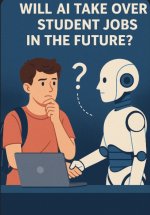View attachment 129256Artificial Intelligence (AI) is rapidly transforming the way we live, learn, and work. From personalized recommendations on YouTube to automated customer support, AI is everywhere. But while these innovations are exciting, they have also created fear—especially among students—about whether AI will eventually replace them in the job market.
As students step into internships, part-time roles, and freelancing opportunities to gain early experience, they are noticing a shift. Many tasks that were once done manually are now handled by AI tools like ChatGPT, Grammarly, Jasper, and others. For instance, companies now use AI to write basic blogs, generate social media content, analyze large data sets, or even handle customer queries. This raises an important question: will AI take over the very jobs students apply for?
The answer is not simple.
AI will definitely change student jobs—but it won’t completely replace them. In fact, it will create new types of opportunities for students who are ready to adapt. For example, content writing with AI doesn't mean students won’t be needed. It means students who know how to use AI tools smartly will be in demand.
Let’s take another example. Data entry jobs are often seen as an easy entry point for students. But now, AI and automation can handle many of these repetitive tasks. Does that mean there’s no future? Not at all. Students who can manage data systems, correct errors, or supervise AI output will still be valuable. In fact, human oversight will always be needed to ensure AI’s work is ethical, accurate, and aligned with real-world logic.
Moreover, AI lacks emotions, human creativity, and the ability to connect on a deeper level. A social media post generated by AI might be informative, but one written by a student who understands real trends and audience behavior will always perform better. Soft skills like communication, critical thinking, and empathy are still beyond AI’s scope.
Students should see AI as a partner, not a threat. It can reduce workload, boost productivity, and open doors to smarter work opportunities. The key is to upskill—learn how to work with AI tools, understand how they function, and combine them with your human.
In conclusion, AI is not here to steal student jobs but to transform them.
The future will belong to those students who are adaptable, creative, and tech-aware. Rather than fearing AI, students should focus on learning how to work alongside it. That’s the real superpower in the modern world
As students step into internships, part-time roles, and freelancing opportunities to gain early experience, they are noticing a shift. Many tasks that were once done manually are now handled by AI tools like ChatGPT, Grammarly, Jasper, and others. For instance, companies now use AI to write basic blogs, generate social media content, analyze large data sets, or even handle customer queries. This raises an important question: will AI take over the very jobs students apply for?
The answer is not simple.
AI will definitely change student jobs—but it won’t completely replace them. In fact, it will create new types of opportunities for students who are ready to adapt. For example, content writing with AI doesn't mean students won’t be needed. It means students who know how to use AI tools smartly will be in demand.
Let’s take another example. Data entry jobs are often seen as an easy entry point for students. But now, AI and automation can handle many of these repetitive tasks. Does that mean there’s no future? Not at all. Students who can manage data systems, correct errors, or supervise AI output will still be valuable. In fact, human oversight will always be needed to ensure AI’s work is ethical, accurate, and aligned with real-world logic.
Moreover, AI lacks emotions, human creativity, and the ability to connect on a deeper level. A social media post generated by AI might be informative, but one written by a student who understands real trends and audience behavior will always perform better. Soft skills like communication, critical thinking, and empathy are still beyond AI’s scope.
Students should see AI as a partner, not a threat. It can reduce workload, boost productivity, and open doors to smarter work opportunities. The key is to upskill—learn how to work with AI tools, understand how they function, and combine them with your human.
In conclusion, AI is not here to steal student jobs but to transform them.
The future will belong to those students who are adaptable, creative, and tech-aware. Rather than fearing AI, students should focus on learning how to work alongside it. That’s the real superpower in the modern world

